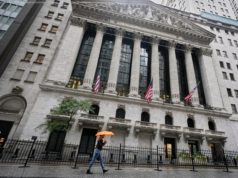US stocks are rising as industrial and consumer-focused companies climb and technology companies recover after sharp losses last week.
U. S. stocks are rising Monday as major indexes rebound from the previous week’s losses. The S&P 500 is on track to break a four-day losing streak as industrial and retail stocks rise. Technology companies are also recovering after their drop last week.
Apple fell after saying a new round of bigger U. S. tariffs could push it to raise prices. Indexes in Asia mostly fell as investors fretted over the possibility of new and bigger U. S. tariffs on Chinese goods.
CBS is skidding after it announced the departure of longtime CEO Les Moonves and Chinese e-commerce company Alibaba is down after it said co-founder Jack Ma will step down as chairman in 2019.
KEEPING SCORE: The S&P 500 index gained 7 points, or 0.3 percent, to 2,879 as of 12:10 p.m. Eastern time. The Dow Jones Industrial Average lost 8 points to 25,907 as health insurer UnitedHealth sank and aerospace company Boeing also traded lower.
The Nasdaq composite edged up 16 points, or 0.2 percent, to 7,919. The Russell 2000 index of smaller-company stocks rose 4 points, or 0.2 percent, to 1,717.
The S&P 500 fell 1 percent last week, its worst drop since late June.
ON THE REBOUND: Industrial and consumer-focused companies rose. 3M gained 1 percent to $214.63 and United Technologies rose 1.5 percent to $133.98. Household good maker Procter & Gamble climbed 1 percent to $82.72 while home improvement retailer Home Depot advanced 1.8 percent to $209.92.
Nike rose 2.1 percent to $82.02. The stock slumped 3 percent Aug. 31 as investors worried about potential backlash to an advertising campaign featuring former San Francisco 49ers quarterback Colin Kaepernick. Nike’s stock has now regained almost all the ground it lost since then.
TECH TURNAROUND? Technology companies moved higher as Microsoft picked up 0.8 percent to $109.08 and Broadcom rose 2.7 percent to $238.96. The S&P 500 technology index fell 2.9 percent last week, its largest loss in one week since March.
Apple missed out on the gains. The stock fell 1.3 percent to $218.40 after it said it could be affected by the $200 billion in proposed tariffs. The company said it might respond by raising prices on some of its products, including the Apple Watch and the Mac mini.
CBS SETTLEMENT: Media company CBS said CEO Les Moonves is stepping down after six more women accused him of sexual misconduct as well as retaliation if they resisted him. Moonves denied the charges in a pair of statements, although he said he had consensual relations with three of the women.
CBS fell 3.7 percent to $54.
As part of a larger deal, CBS wrapped up litigation with its parent company, National Amusements. CBS said it won’t issue a special stock dividend that would have weakened National Amusements’ control of CBS, and the company won’t try to merge CBS with Viacom.
TOUGH TO SAY GOODBYE: Alibaba fell 3.3 percent to $157.05 after the e-commerce company said company founder Jack Ma will step down as chairman in September 2019. The next chairman will be Daniel Zhang. Zhang replaced Ma as CEO in 2013.
U. S.-CHINA TRADE: The Trump administration could soon announce tariffs on $200 billion in goods imported from China, and on Friday, U. S. President Donald Trump threatened to put taxes on another $267 billion in goods. That would cover essentially all products imported from China.
The U. S. has already imposed tariffs on $50 billion in Chinese products, for which Beijing has retaliated with an equal amount of import taxes on U. S. goods.
Hong Kong’s Hang Seng index tumbled 1.3 percent. It’s down almost 20 percent from its peak early this year, close to the entering what Wall Street calls a «bear market,» or a particularly steep decline.
OVERSEAS: France’s CAC 40 added 0.3 percent and the German DAX moved up 0.2 percent following reports the European Union and Britain might soon reach a deal for Britain’s departure from the European Union. The pound strengthened and Britain’s FTSE 100 was unchanged percent.
BUYING, NOT RENTING: United Rentals climbed 5.6 percent to $160.90 up after saying it will buy competitor BlueLine for $2.1 billion.
CONTRACTOR DEAL: SAIC dropped 12.3 percent to $78.77 after it agreed to buy Engility Holdings for $2.5 billion in stock. Engility provides engineering services, training and other services to the U. S. government, and SAIC is another major government contractor.
Engility shares fell 3.9 percent to $34.81.
ENERGY: Benchmark U. S. crude fell 0.4percent to $67.50 a barrel in New York. Brent crude, used to price international oils, gained 0.3 percent to $77.04 a barrel in London.
BONDS: Bond prices edged higher. The yield on the 10-year Treasury note fell to 2.93 percent from 2.94 percent.
CURRENCIES: The dollar rose to 111.10 yen from 111.06 yen. The euro rose to $1.1603 from $1.1566
JAPAN: Japan’s benchmark Nikkei 225 climbed 0.3 percent after the country’s gross domestic product surpassed expectations by growing at a 3 percent annual rate in the second quarter.






